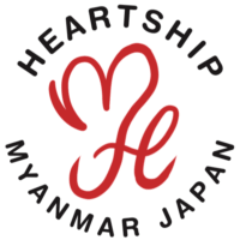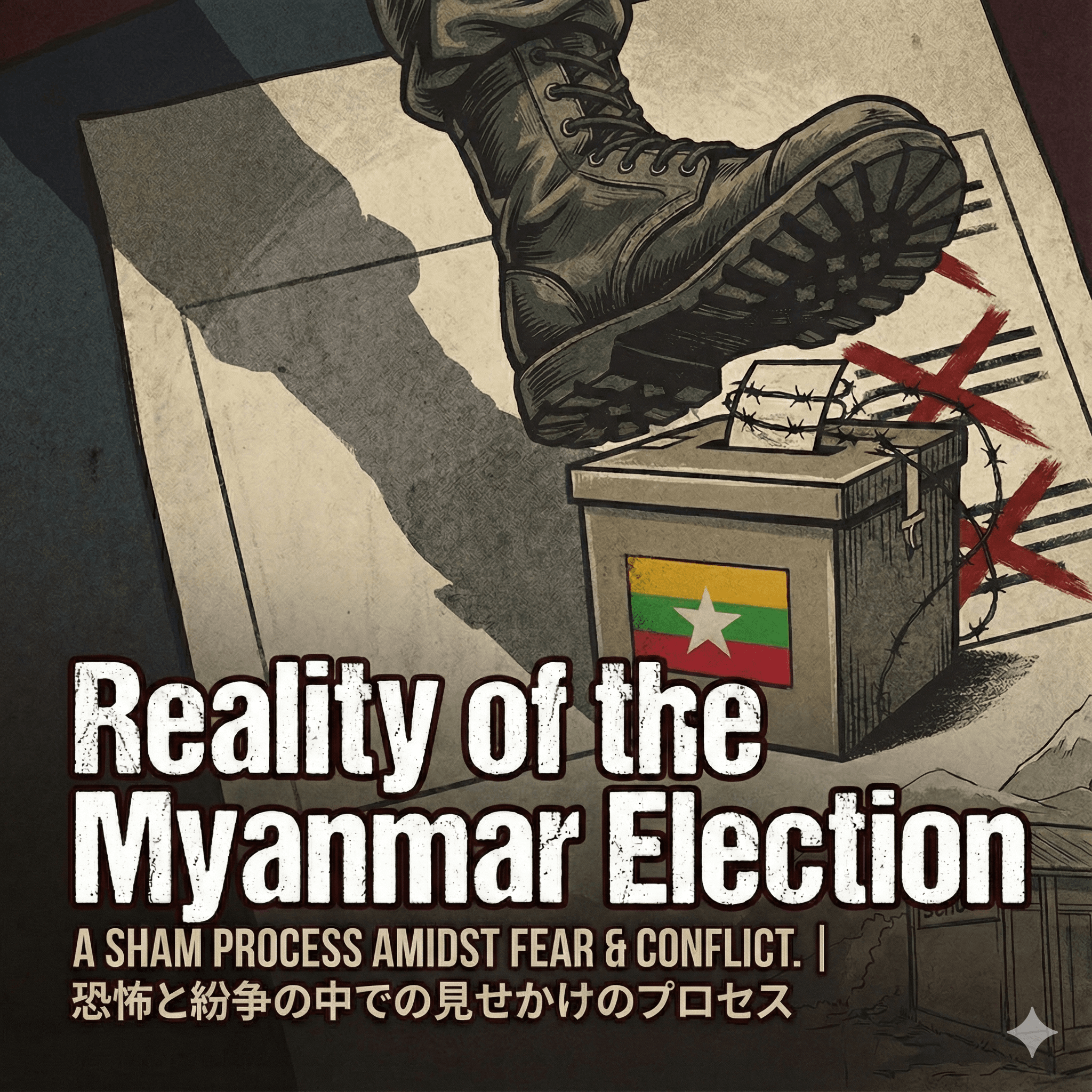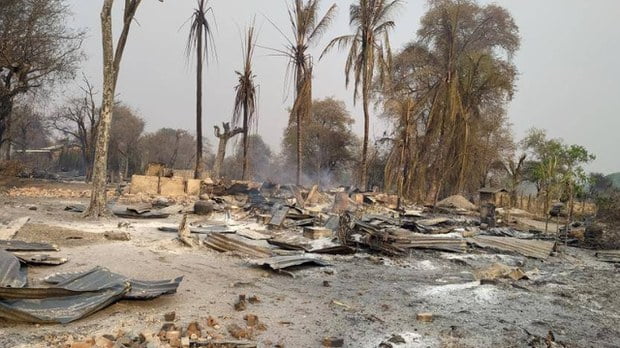As reported on NHK World Japan, Myanmar’s democracy leaders recently visited Japan, to spread word on what is happening in Myanmar and to seek support.
NHK World Japanで報道された通り、ミャンマー民主化のリーダーらが日本を訪れ、国の現状と支援を訴えました。
Senior officials of Myanmar’s ethnic minority and pro-democracy groups visited Tokyo in May to request support for their struggle against the ruling junta. The rebel alliance has escalated its resistance since October, prompting brutal reprisals that have worsened Myanmar’s humanitarian crisis.
NHK spoke to the head of the Karen National Union (KNU) and a minister of the shadow National Unity Government (NUG) during their visit.
ミャンマーの少数民族と民主化団体の幹部が5月に東京を訪れ、軍事政権との闘いへの支援を要請した。反体制派が10月以降、抵抗を活発化させる中、国軍による残忍な報復がミャンマーの人道危機を悪化させている。
NHKは、来日中のカレン民族同盟(KNU)の代表と影の政府である国民統合政府(NUG)の大臣に話を聞いた。
The resistance leaders spent seven days in Japan meeting officials, Diet members and reporters. During their stay, they called for a unified front against the military’s oppression.
レジスタンスの指導者たちは7日間日本に滞在し、政府関係者や国会議員、記者団と会談した。滞在中、彼らは軍の弾圧に対する統一戦線を呼びかけた。
“I’d like this visit to symbolize the cooperation between ethnic groups and the NUG,” said Padoh Saw Kwe Htoo Win, Chairman of the KNU.
KNUのPadoh Saw Kwe Htoo Win議長は「今回の訪問は、民族とNUGの協力関係を象徴するものにしたい」と語った。
Zaw Wai Soe, the NUG’s Minister of Education and Health, echoed that message. “The ethnic armed organizations are more experienced in politics than we are, and the NUG has much to learn from them.”
NUGの教育・保健大臣であるZaw Wai Soe氏もこのメッセージに賛同し「民族武装組織は我々よりも政治経験が豊富であり、NUGは彼らから学ぶことが多い」と述べた。
Coordination is key
The resistance alliance was forged after the coup in 2021, when peaceful demonstrations by civilians were brutally put down by the military and young people began taking up weapons to defend themselves. They fled to areas controlled by ethnic armed groups that have been fighting the junta military for decades.
協調がカギ
2021年のクーデター後、市民による平和的なデモが軍によって残酷に鎮圧され、若者たちが自衛のために武器を取り始めたことから、レジスタンス同盟が結成された。彼らは、何十年もの間、軍部と戦ってきた民族武装グループの支配地域に逃げ込んだ。
The NUG, a group of ousted lawmakers, was among those who sought the help of the ethnic groups ― including the KNU, from Karen State in southeastern Myanmar, which has fought for autonomy since the country’s independence in 1948. The KNU and other groups agreed to train and supply newly formed militias.
1948年の独立以来、自治を求めて戦ってきたミャンマー南東部カレン州のKNUを含む民族グループに助けを求めたのは、追放された議員のグループであるNUGだった。KNUと他のグループは、新しく結成された民兵を訓練し、供給することに同意した。
The KNU’s military branch has been training civilian militias, collectively known as the People’s Defense Forces (PDF). 人民防衛軍(PDF)民間民兵を訓練するKNUの軍事部門
The resistance has made major gains on the battlefield in recent months. According to a local independent media outlet, the rebels now control over 50 towns. In response, the military has been escalating its terror tactics against civilians.
レジスタンス側はここ数ヶ月、戦場で大きな成果を上げている。地元の独立系メディアによると、反政府勢力は現在50以上の町を支配しているという。これに対して国軍は、市民に対するテロ戦術をエスカレートさせている。
The result, says Zaw Wai Soe, is a deepening humanitarian crisis.
“The Japanese government should impose economic sanctions on the military dictatorship,” he says. “We believe there are many things Japan can do in cooperation with international organizations and neighboring countries, such as stopping the flow of foreign currency to buy fuel and weapons for airstrikes.”
その結果、人道危機が深まっているとZaw Wai Soeは言う。
「日本政府は軍事独裁政権に経済制裁を科すべきです。空爆用の燃料や武器を購入するための外貨の流入を止めるなど、国際機関や近隣諸国と協力して、日本ができることはたくさんあると信じています。」
As of May 27, resistance forces had captured 59 towns. 5月27日現在、レジスタンス軍は59の町を占領している。Source/出典 BNI-Myanmar Peace Monitor
Building a federal democracy
The resistance in Myanmar is already looking ahead to life after the junta. It has released plans to install a democratic constitution. The new charter would entail federal power overseeing states, each with its own legislative, executive, and judicial authority.
連邦民主主義の構築
ミャンマーのレジスタンス勢力は、すでに政権崩壊後の生活を見据えている。民主的な憲法を制定する計画を発表した。新しい憲章は、連邦権力が州を監督し、それぞれが立法、行政、司法の権限を持つというものだ。
But that transition comes with major challenges ― a situation that requires a new strategy from the outside world. ”The international community has proposed negotiating with the military, but the military itself is to blame for these issues,” said Padhoh Saw Kwe Htoo Win. “We would like (other countries) to prioritize discussions with us as a way of finding a solution to our political aims.”
しかし、この移行には大きな課題がつきまとう。「国際社会は軍との交渉を提案していますが、問題の責任は軍自身にあります。私たちは、政治的な目的の解決策を見つける方法として、私たちとの話し合いを優先してほしいのです。」
There are signs this is already happening.
While in Japan, the officials exchanged ideas with a bipartisan coalition of Diet members supporting Myanmar’s democratization. That was followed by talks between the ethnic armed groups and senior officials of Japan’s Foreign Ministry, underlining the shift in Tokyo’s policy toward Myanmar.
変化の兆し
日本滞在中、ミャンマーの民主化を支持する超党派の国会議員連盟と意見交換を行った。続いて民族武装グループと日本の外務省高官との会談が行われ、東京の対ミャンマー政策の転換が強調された。
Parliamentary Vice-Minister for Japanese Foreign Affairs Komura Masahiro (right) received a courtesy call from the delegation. 代表団の表敬を受けた小村正弘外務政務次官(右)。Source/出典 日本外務省
Padoh Saw Kwe Htoo Win says Myanmar’s ethnic groups and the NUG share common principles: First, the military must not be involved in politics, and must be subject to a government elected by the people. Second, the country must transition to a federal democratic state in the future. Third, fairness must be ensured during the transition period.
Padoh Saw Kwe Htoo Win氏は、ミャンマーの民族グループとNUGには共通の原則があると語る: 第一に、軍は政治に関与してはならず、国民によって選ばれた政府に従わなければならない。第二に、ミャンマーは将来的に連邦民主国家に移行しなければならない。第三に、移行期間中も公平性が確保されなければならない。
“We must also discuss how to integrate armed organizations to support national defense,” he added. “We didn’t seek conflict 76 years ago. We have been advocating the right of our people to live while developing as one ethnic group. In the end, there was no other choice, and we decided to take up arms.”
「国防を支える武装組織をどのように統合するかも議論しなければならない。我々は76年前に紛争を求めたわけではない。私たちは、それぞれの民族が一つの民族として発展しながら生きていく権利を主張してきた。しかし結局、武器を取るしか選択肢がなくなってしまった。
Zaw Wai Soe also says it’s important that Myanmar preserve its ethnic cultures. “Since ours is a diverse nation made up of 135 ethnic groups, we must allow students to receive education in their native tongue,” he says. “We must develop native languages and cultures. We will work with all the ethnic groups to build a new education system from the bottom up.”
ザウ・ワイ・ソーはまた、ミャンマーが民族文化を守ることが重要だと言う。「我々は135の民族からなる多様な国家であるため、学生たちが母国語で教育を受けられるようにしなければなりません。母国語と文化を発展させなければなりません。すべての民族と協力し、ボトムアップで新しい教育システムを構築していきます。」
The UN says more than 260 million people are displaced across Myanmar. 国連によると、ミャンマー全土で2億6000万人以上が避難生活を強いられている
Urgent action needed to save lives
Three years after the coup, the number of Myanmar soldiers is believed to have shrunk from 400,000 to 130,000. In February, the junta announced a call-up for people 18 and older.
クーデターから3年後、ミャンマー兵の数は40万人から13万人にまで減少したと考えられている。2月、ミャンマー政府は18歳以上の兵士の招集を発表した。
“This shows that the military has no grip on the future,” says Zaw Wai Soe. “It has led to many young people being unwilling to remain in Myanmar and fleeing abroad. This is a loss to our nation, and we are doing everything we can to prevent this loss from continuing.”
「このことは、軍が将来について何も把握していないことを示しています」とZaw Wai Soeは言う。「多くの若者がミャンマーに留まることを望まず、海外に逃亡するようになりました。これは私たちの国にとっての損失であり、私たちはこの損失が続くのを防ぐためにできる限りのことをしています。」
A conscription order is prompting young people to flee Myanmar.徴兵令により若者のミャンマー脱出が促されている
Without assistance from the international community, Padoh Saw Kwe Htoo Win says, it will be hard for Myanmar to lift itself out of poverty. ”Our needs are too big, and it is impossible to solve the problem on our own. ASEAN organizations are providing support, but since the military regime is the gateway, it is difficult to reach the refugees, who are in desperate need. ”
”Please provide cross-border aid to the fullest extent possible, so it directly reaches the Myanmar people.”
Padoh Saw Kwe Htoo Win は言う。「国際社会からの援助がなければ、ミャンマーが貧困から脱却することは難しいでしょう。私たちのニーズはあまりにも大きく、私たちだけで問題を解決するのは不可能です。ASEANの組織が支援を行っていますが、軍事政権が入り口になっているため、絶望的な状況にある難民に支援が届きにくくなっています。」
「国境を越えた援助を可能な限り行い、どうかミャンマーの人々に直接届くようにしてください。」




